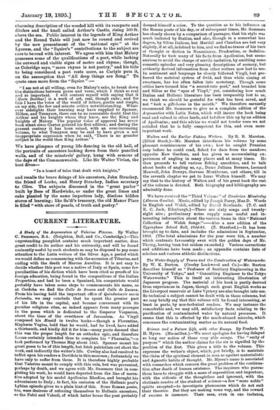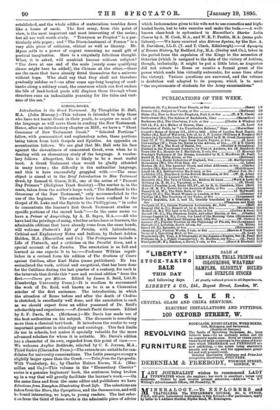Science and a Future Life, with other Essays. By Frederic
W. H. Myers. (Macmillan.)—We must apologise for having delayed so long our notice of these very able essays. The "unity of purpose" which the author claims for the six is signified by the position of the first. This gives a title to the volume. This expresses the writer's object, which, put briefly, is to maintain the claim of the spiritual element in man as against materialistic and Agnostic habits of thought. Mr. Myers's name is associated with researches which concern the great problem of the continua- tion after death of human existence. The inquirers who pursue them have to struggle with a mass of superstition and imposture, with the ridicule of the thoughtless and ignorant, with the obstinate resolve of the student of science—a few "more noble" spirits excepted—to investigate phenomena which do not suit their theories. But they are making some way, and the reward of success is immense. Their case, even in one instance.
established, and the whole edifice of materialism tumbles down like a house of cards. The first essay, from this point of view, is the most important and most interesting of the series ; but all are well worth study. "Tennyson as Prophet" is a par- ticularly able paper ; and "The Disenchantment of France" is a very able piece of criticism, ethical as well as literary. Mr. Myers adds to a power of cogent reasoning no small gift of poetical imagination. Here is a singularly felicitous thought. What, it is asked, will mankind become without religion ? "The Jews at one end of the scale [surely some qualifying clause might here be added], the Chinese at the other,—these are the races that have already fitted themselves for a universe without hope. Who shall say that they shall not therefore gradually subdue us ?—as after some age-long heaping of sand- banks along a solitary coast, the creatures which can first endure the life of land-locked pools will displace those through whose structure runs an indomitable yearning for the tides and vast- ness of the sea."



































 Previous page
Previous page